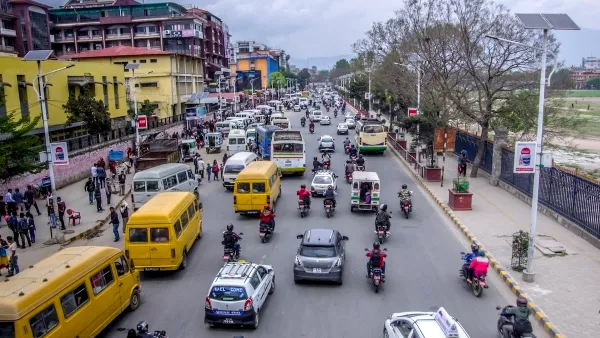Despite the extreme weather events of the past year, most Americans are still not persuaded that climate change is primarily the result of human activity. Why not?
Despite the extreme weather events of the past year, most Americans are still not persuaded that climate change is primarily the result of human activity. Why not?
In large part, the problem is beyond environmentalists' control, for at least two reasons. First, public concern over the troubled economy has crowded out public interest in more long-run problems (including, but not limited to, climate change). Second, a large fraction of voters get their information from the right-wing media, which distinguishes itself from the competition by attacking President Obama. So if President Obama supports doing something about climate change, Fox News and right-wing AM radio are tempted to deny that climate change even exists.
But after having been on numerous environmentalist mailing lists, listservs, etc. I have come to believe that environmentalist rhetoric is sometimes unhelpful. Just as Tea Party extremism makes Republicans look bad to swing voters, much of what I've read in the environmentalist media might be off-putting outside the environmentalist base.
On one extreme, environmentalists sometimes use overheated rhetoric (pun intended). Environmentalist rhetoric about "saving the Earth" may fire up the already-persuaded, but may sound wacky to the unconvinced - and disconcerting to religious voters whose traditions tell them that God will ultimately supply a Messiah, or at least not wipe out life on Earth (Gen. 8:21). Moreover, I don't think you need to tell people that all of humanity will be destroyed in order to give them reason to worry. For example, climate change could cause a flood of natural disasters (pun intended) which wipes out large stretches of American coastline, eliminates a big chunk of our food supply, and brings the U.S. economy to its knees. Such disasters are perfectly consistent with anyone's religious tradition, yet sufficiently harmful to be worth taking aggressive measures to avoid.
At the other extreme, environmentalists sometimes focus on trivia, going on the warpath against one consumer product or another - sometimes products as trivial as plastic straws, or as important as air conditioning. These "Austerity Green" crusades do give the environmentalist base a way to feel useful, but aren't likely to materially affect climate change. More importantly, Austerity Green tells swing voters: environmentalism means making your life more difficult and uncomfortable, with no obvious payoff. A reader subjected to such views may be converted, but may also deny the existence of any climate change problem at all in order to avoid feeling guilty about not following the Austerity Green agenda. (Of course, I'm assuming that the unconverted actually read this stuff- perhaps a fanciful assumption!)
By contrast, conservatism is successful precisely when its promises of austerity are vague (e.g. unspecified cuts in wasteful spending, which voters are likely to think will affect someone other than themselves).
But you may argue: doing something about climate change is likely to involve some policies that might make something more expensive to someone, whether it be subsidies to clean energy (some of which will inevitably turn out badly), regulations to limit pollution (which may increase energy prices in the short run) or carbon taxes. And so perhaps even the best-sold environmental policies might be a hard sell in today's political climate. Nevertheless I do wonder if environmentalist rhetoric makes these policies an even harder sell than necessary.

Planetizen Federal Action Tracker
A weekly monitor of how Trump’s orders and actions are impacting planners and planning in America.

Map: Where Senate Republicans Want to Sell Your Public Lands
For public land advocates, the Senate Republicans’ proposal to sell millions of acres of public land in the West is “the biggest fight of their careers.”

Restaurant Patios Were a Pandemic Win — Why Were They so Hard to Keep?
Social distancing requirements and changes in travel patterns prompted cities to pilot new uses for street and sidewalk space. Then it got complicated.

Platform Pilsner: Vancouver Transit Agency Releases... a Beer?
TransLink will receive a portion of every sale of the four-pack.

Toronto Weighs Cheaper Transit, Parking Hikes for Major Events
Special event rates would take effect during large festivals, sports games and concerts to ‘discourage driving, manage congestion and free up space for transit.”

Berlin to Consider Car-Free Zone Larger Than Manhattan
The area bound by the 22-mile Ringbahn would still allow 12 uses of a private automobile per year per person, and several other exemptions.
Urban Design for Planners 1: Software Tools
This six-course series explores essential urban design concepts using open source software and equips planners with the tools they need to participate fully in the urban design process.
Planning for Universal Design
Learn the tools for implementing Universal Design in planning regulations.
Heyer Gruel & Associates PA
JM Goldson LLC
Custer County Colorado
City of Camden Redevelopment Agency
City of Astoria
Transportation Research & Education Center (TREC) at Portland State University
Camden Redevelopment Agency
City of Claremont
Municipality of Princeton (NJ)






























